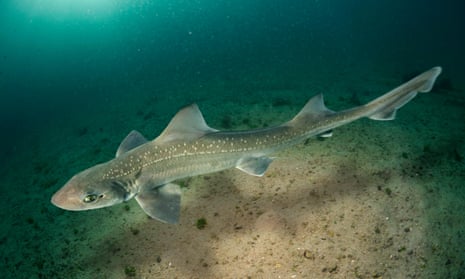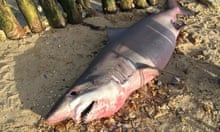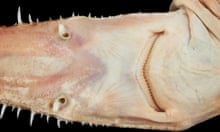The tide is ebbing at South Milton Sands, and soon the rock arch will stand naked over the reef. I’m snorkelling in the last few feet of glassy water, floating above glistening maroon tongues of dulse and the mossy puffs of sea flaxweed (Stypocaulon scoparium). It’s getting shallow. I clasp a barnacled rock to pull myself forward, while a trigger fish, pectoral fins pulsing, watches me with its long, bovine face.
Then I’m stopped dead. Miraculously, thrillingly, a shark-shadow glides beneath me. I flounder round and the shadow does the same: it folds itself through 180 degrees to effortlessly pass me again. It’s probably a starry smooth-hound, Mustelus asterias, though in the moment I forget to check for the constellation of white spots on its dark, taut back. From deeply serrated tail to rounded snout it is about a metre long.
As the unmoved trigger fish seems to know, smooth-hounds prefer crustaceans, using their flat teeth to smash the shells of lobsters, crabs and shrimps. Their teeth still have bite though. Last summer, just five miles from here, a smooth-hound carried out the only recorded shark attack on a surfer in Britain. The animal was probably disorientated by the waves and only inflicted injuries that could, as one article observed, have been caused by a drunken encounter with a bramble bush.
Smooth-hounds are one of several species that can turn up in fish suppers as “rock salmon”, but outside the Mediterranean they are not a target for commercial fisheries. The anglers who fish for sport mostly release their catch, allowing the sharks to grow into larger quarry over their 20-year lifespan. Numbers in the north Atlantic are on the increase, according to the Plymouth-based Shark Trust.
Meanwhile my smooth-hound is rapidly getting away. I turn to follow it but with a few effortless weaves it’s gone, vanished into the seaweed. I lift my head up and the beach sounds reappear. Surfin’ Sam is still sitting next to her kayaks for hire, reading a novel with a creased cover. Late-summer barbecue smoke rises to meet the wispy clouds and plastic spades hack into the sand. Terrestrial life goes on, oblivious to the submarine drama just a few metres away.










Comments (…)
Sign in or create your Guardian account to join the discussion